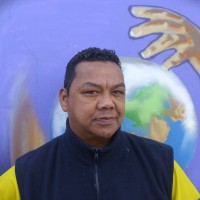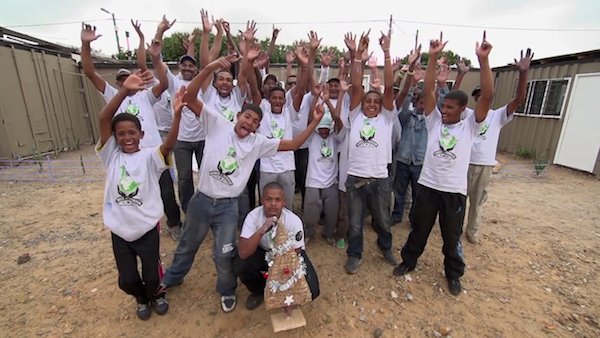
Hands of Honour’s up-cycling project seeks to address three problems in Cape Town:
- Prolonged unemployment;
- Physically run down spaces;
- Effective management of obsolete stock / recyclable waste.
Hands of Honour employs individuals drawn from a large pool,languishing in soup kitchens, to up-cycle obsolete stock and recyclable items. Much of this waste is provided through partnerships with the corporate sector and would otherwise end up in landfills. Workers process the waste, either rehabilitating material or stripping goods for the sale of parts. Partner Corporations are the main providers of this waste/obsolete stock through ”donating” their obsolete stock/waste/redundant stock, rather than send on to the landfill. i-genius talks with Hands of Honour Founding Director, Paul Taliaard to find out more.
–

–
i-genius: Why did you start Hands of Honour?
Paul Taliaard: I started Hands of Honour in response to the alarming increase in the amount of young and adult men, just languishing in soup kitchens, all over Cape Town.
Paul Taliaard: I started Hands of Honour in response to the alarming increase in the amount of young and adult men, just languishing in soup kitchens, all over Cape Town.
–
i-genius: What makes a good candidate for a Founder of a company?
Paul: I would say perseverance or in my case, plain ol’ pigheadedness!
–
i-genius: Who’s/what’s been your continued source of inspiration?
Paul: The team from the UK who introduced me to Social Enterprises. (Unlimited UK). Nothing like a kick in the rear end to get one going.
Paul: The team from the UK who introduced me to Social Enterprises. (Unlimited UK). Nothing like a kick in the rear end to get one going.
–
i-genius: In what way is Hands of Honour a social enterprise?
Paul: Obsolete stock heading for landfill get’s up-cycled by marginalized individuals,creat
Paul: Obsolete stock heading for landfill get’s up-cycled by marginalized individuals,creat
–
i-genius: What difficulties did you experience setting up Hands of Honour?
Paul: I Had many obstacles. Many people,including community leaders, were very skeptical that I would be able to transform a bunch of social outcasts into a force for the greater good in their own community.Then there was the spirit of despondency among the men themselves.Needless to say,I proved them wrong(big smile).
Paul: I Had many obstacles. Many people,including community leaders, were very skeptical that I would be able to transform a bunch of social outcasts into a force for the greater good in their own community.Then there was the spirit of despondency among the men themselves.Needless to say,I proved them wrong(big smile).
–
i-genius: What are the most crucial things you have done to grow Hands of Honour?
Paul: Starting our up-cycling venture as the main income generator and getting the Hands of Honour cause out into the public eyes.
Paul: Starting our up-cycling venture as the main income generator and getting the Hands of Honour cause out into the public eyes.
–
i-genius: Have partnerships helped or hindered your business/project?
Paul: Our partnerships with Corporations have been excellent for our growth, especially the corporations who allow us to collect their obsolete stock/waste.A hindrance has been the stop -start relationship with our local government.Sadly,Social Enterprises are not yet fully understood by local government officials,making it very hard to form meaningful and effective partnerships.
Paul: Our partnerships with Corporations have been excellent for our growth, especially the corporations who allow us to collect their obsolete stock/waste.A hindrance has been the stop -start relationship with our local government.Sadly,Social Enterprises are not yet fully understood by local government officials,making it very hard to form meaningful and effective partnerships.
–
i-genius: Why is eradicating prolonged unemployment important?
Paul: Prolonged employment has bred a culture of gangs and drugs.This gang/drug culture has become a generational issue.Stemming unemployment will allow fathers to become positive role models for sons as breadwinners and community leaders.
Paul: Prolonged employment has bred a culture of gangs and drugs.This gang/drug culture has become a generational issue.Stemming unemployment will allow fathers to become positive role models for sons as breadwinners and community leaders.
–
i-genius: Action 4 Children? What’s that all about?
Paul: There are very few positive role models for youth in areas torn apart by gangs,drugs and poverty.Action 4 Children involves assisting children who are battling with school uniforms,.school fees and meals.We also create food gardens at Childrens Homes.Young boys ,prone to the gang lifestyle, are mentored by Hands of Honour members about the perils of experimenting with drugs, crime and casual sex.
Paul: There are very few positive role models for youth in areas torn apart by gangs,drugs and poverty.Action 4 Children involves assisting children who are battling with school uniforms,.school fees and meals.We also create food gardens at Childrens Homes.Young boys ,prone to the gang lifestyle, are mentored by Hands of Honour members about the perils of experimenting with drugs, crime and casual sex.
–
i-genius: What is your favourite motto in life?
Paul: Negative things happening now won’t matter in ten years time.
Paul: Negative things happening now won’t matter in ten years time.
–
i-genius: What’s the worst business advice you’ve ever received?
Paul: Start tendering for government contracts. It’s easy.
Paul: Start tendering for government contracts. It’s easy.
–
i-genius: What advice would you give to those starting up a social business/project?
Paul: Be teachable yet stubborn in your quest.
Paul: Be teachable yet stubborn in your quest.
–
–
This interview was conducted as part of the i-genius Getting Started interview series. If you would like to learn how to get started in your social business, then why not take our ‘Getting Started – Social Business Start Up’ online course with i-genius Academy. To find out more, click here!

